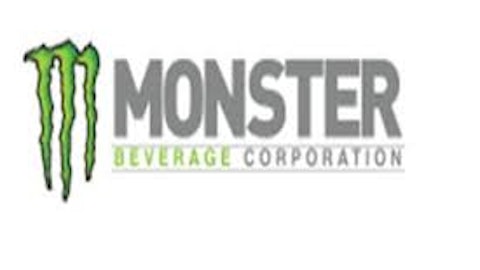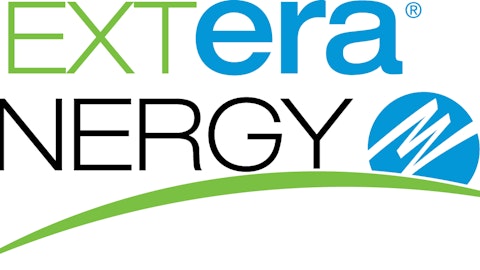In an industry that’s becoming increasingly competitive, I still like Monster Beverage Corp (NASDAQ:MNST) as the best pure-play in the fast-growing energy drink market. The stock has been underperforming due to regulatory concerns and lawsuits, but this could present a great buying opportunity.
Fast access to the growing energy drink market is hard to find, given that Monster is the only publicly traded energy drink company among the three leaders in the energy drink market. Moreover, Beverage Digest believes that Monster Beverage Corp (NASDAQ:MNST) has the top position in volume market share:

Source: Beverage Digest
Also, monster has a one of the leading positions when it comes to dollar value market share:

Source: Beverage Digest
Energized tailwinds
Monster Beverage Corp (NASDAQ:MNST) saw revenue up 21% in 2012 driven by new product introductions and geographic expansion, including the launch of products in Peru and Chile. Additional geographical roll outs will be focused on Central and Eastern Europe. This is a big opportunity, given that international sales only account for just over 20% of revenues, leaving tons of room for growth.
Monster Beverage Corp (NASDAQ:MNST) also has industry tailwinds, with the Beverage Marketing Corp. expecting the U.S. liquid refreshment beverage market to grow 1% in 2012, reaching 29.8 billion gallons, after having grown 0.7% in 2011 and 2010. Although energy drinks make up a smaller portion of the total carbonated beverage business, in 2012, energy drink volume consumption was up more than any other category, growing 14.3%, with ready to drink coffee in second at 9.5%.
Earlier this month, Stifel Nichols said gross sales in both April and May were up 9% year over year. Stifel also believes that the negative publicity and regulatory overhang is over-done and the end-demand market will see little impact.
Other ways to invest
Major beverage companies PepsiCo, Inc. (NYSE:PEP) and Coca-Cola Enterprises Inc (NYSE:CCE) both own a small piece of the energy market. Pepsi, however, is not only a beverage company; it’s also a snack foods company. One of its largest segments is the domestic snack foods business, including the Fritos, Lay’s, Doritos and Quaker brands, makes up 20% of revenues. The company’s major segment is its beverage segment, though, making up 33% of revenues. This segment includes the Amp Energy product.
PepsiCo, Inc. (NYSE:PEP) sales in 2013 are expected to see modest 3% growth, with this revenue growth paling in comparison to what you will find in the energy drink market. However, on the positive side, Pepsi hopes to return some $6.4 billion to shareholders in the form of dividends and repurchases in 2013.
Some of Pepsi’s longer-term initiatives include exposure to the international markets, as well as a focus on health and wellness products. Other recent news is that PepsiCo, Inc. (NYSE:PEP) appointed Kristin Patrick, Playboy’s top marketer, as global chief. This is just one of Pepsi’s efforts to gain a better footing in the U.S. beverage market via increased marketing and advertising. Other big news is that the activist hedge fund Trian Fund might be looking to push Mondelez International Inc (NASDAQ:MDLZ) and Pepsi to merge.
The other major beverage company, Coca-Coal, is one of the dominant beverage leaders in the U.S. Its Coca-Cola beverages accounted for 48% of total U.S. unit case volume. Coca-Cola has been re-franchising its U.S. bottling operations, including five partnerships with five U.S. bottlers. These moves should help margins go higher, but I still see interim margin pressure related to the firm’s attempt to expand its international presence in faster-growing emerging markets.
One of the benefits of investing in the more stable soft drink companies is that they do offer income: PepsiCo, Inc. (NYSE:PEP) and Coca-Cola both pay a 2.7% dividend.
Dr Pepper Snapple Group Inc. (NYSE:DPS) is primarily a soft drink company, with beverage concentrates making up 20% of sales and 70% of revenues tied to packaged beverages. The other issue is that Dr. Pepper is primarily a U.S. operator, generating some 90% of revenue from the country. What’s more is that Dr. Pepper does not participate in the sports drinks, energy drink, or bottled water markets.
This less diverse portfolio of non-carbonated drinks should strain Dr Pepper (NYSE:DPS)’s growth going forward. Revenue growth is expected to come in at a mere 2.3% this year, which will be driven by its TEN platform offering 10-calorie versions of 7UP, A&W, Sunkist, Canada Dry, and RC. Yet, this is likely to strain margins going forward due to marketing and promotion investments to expand this new platform. It is worth noting that Dr. Pepper does sport a 3.2% dividend yield.
What hedge funds think
Going into 2Q, there were a total of 38 hedge funds long Monster, which was an impressive 36% increase from the previous quarter. This includes Ricky Sandler’s Eminence Capital with the largest position, $92.8 million, making up 2.4% of its 13F portfolio (check out Eminence’s top picks).
PepsiCo, Inc. (NYSE:PEP) had 47 hedge funds long the stock at the end of 1Q, which was essentially flat form the previous quarter. However, Donald Yacktman’s $1.8 billion position in the beverage company makes up 9.3% of his hedge fund’s portfolio; serious conviction (check out Yacktman’s top stocks).
Meanwhile, Coca-Cola has a robust 59 hedge funds long the shares, with billionaire Warren Buffett’s Berkshire Hathaway as one of its biggest backers. Buffett holds a $16.2 billion position in the stock, which made up 19% of Berkshire’s 13F portfolio (see Buffett’s cheap stocks).
The bottom line
Sure, you can invest in the likes of PepsiCo, Inc. (NYSE:PEP) or Coca-Cola, but I like investing in Monster for its greater exposure to the energy drink market. With a return on equity that’s in excess of 35%, it’s hard not to get excited about Monster. Analysts expect Monster to grow EPS at an annualized 16% over the next five years, which is well above the 9% growth expected for Pepsi and Coca-Cola. Yet, Monster has underperformed both by at least 30 percentage points over the past 12 months. I think this trend is likely to reverse itself over the next 12 months.
Marshall Hargrave has no position in any stocks mentioned. The Motley Fool recommends Coca-Cola, Monster Beverage (NASDAQ:MNST), and PepsiCo (NYSE:PEP). The Motley Fool owns shares of Monster Beverage and PepsiCo.
The article How to Energize Your Portfolio originally appeared on Fool.com.
Copyright © 1995 – 2013 The Motley Fool, LLC. All rights reserved. The Motley Fool has a disclosure policy.





